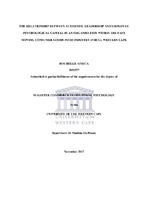| dc.description.abstract | The recent economic situation in South Africa including the weak rand has led to a number of
problems within the workplace including, retrenchment, unemployment, protracted strikes,
decrease in motivation and fear of being jobless (Du Plessis & Barkhuizen, 2012). Instead of
focusing on how the economy negatively affects employees with regards to their burnout,
stress and job insecurity, organisations need to take a more positive approach and consider
how individuals persevere through challenging times and still maintain a high sense of work
performance.
Recently that notion has changed as organisations moved their focus to positive
organisational psychology. The positive psychology movement was spearheaded by Martin
Seligman (Luthans, 2002). Seligman who was the American Psychology Association
President began to understand and realised that little focus was given to the individual?s
strength and that was how the positive psychology movement started (Luthans, 2002).
Authentic leadership studies the leader?s transparent and genuine leadership style. Authentic
leadership is an important leadership characteristic as the employees will start to trust their
authentic leaders and hence the leader will be more likely to role-model behaviours that
include hope, efficacy, resilience, and optimism, which form the core dimensions of
psychological capital. The study will establish whether the leader?s leadership style has an
impact on the employee?s psychological capital.
Data was collected through the psychological capital questionnaire (PCQ) the authentic
leadership questionnaire (ALQ) and a biographical questionnaire. Probability sampling was
used to gather the data of the present study. The data was analysed using statistical package
for social science (SPSS).The study found that there was a relationship between authentic leadership and the three
dimensions of psychological capital (hope, efficacy, and optimism). The dimension of
resilience had no correlation with authentic leadership, which means that the leader?s
leadership style does not influence or motivate the employee to be resilient. From the
findings, it is evident that the organisation needs to focus more on the authentic leadership
behaviours and resilience of employees. This is likely to assist the organisation with
improving retention and engagement of employees. | |

